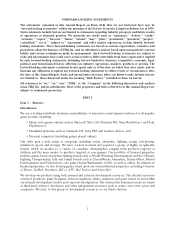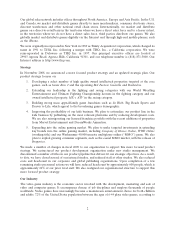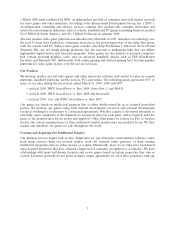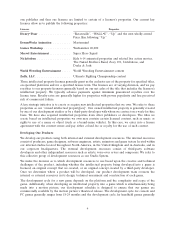THQ 2009 Annual Report Download - page 17
Download and view the complete annual report
Please find page 17 of the 2009 THQ annual report below. You can navigate through the pages in the report by either clicking on the pages listed below, or by using the keyword search tool below to find specific information within the annual report.Since a significant portion of our net sales are based upon licensed properties, failure to renew such
licenses, or renewals of such licenses on less advantageous terms, could cause our revenue to decline.
Games we develop based upon licensed brands make up a substantial portion of our sales each year. In
fiscal 2009, sales of titles for our three top-selling licensed brands, Disney•Pixar, Nickelodeon and World
Wrestling Entertainment (‘‘WWE’’) comprised 47% of our net sales; and in fiscal 2008, 54% of our net
sales were based on titles from such brands. A limited number of licensed brands may continue to produce
a disproportionately large amount of our sales. Due to the importance to us of a limited number of brands
and the intense competition from other video game publishers and the owners of such intellectual
properties in the case of Disney•Pixar and Nickelodeon, to publish games based upon these licensed
brands, we may not be able to renew our current licenses or may have to renew a brand license on less
advantageous terms, which could significantly lower our revenues. In addition, some of our key licensors
have increased their development of video games as more fully discussed in our ‘‘Risk factors related to
competition’’ below.
We are currently involved in litigation with the WWE with respect to our video game license. Since WWE
titles make up a significant portion of our sales, our inability to retain the license could negatively impact
our revenues and profitability. See, Item 3 ‘‘Legal Proceedings’’ for a more detailed discussion of this
litigation.
A decrease in the popularity of our licensed brands can materially affect our revenue and financial position.
A significant portion of our net sales are derived from products based on popular licensed properties. A
decrease in the popularity of the underlying property of our licenses could negatively impact our ability to
sell games based on such licenses and could lead to an impairment of our licenses.
Our inability to acquire or create new intellectual property that has a high level of consumer recognition or
acceptance could negatively impact our revenues and profitability.
We generate a portion of our revenue from wholly-owned intellectual property. The success of our internal
brands depends on our ability to create original ideas that appeal to the avid gamer. Titles based on wholly-
owned intellectual property can be expensive to develop and market since they do not have a built-in
consumer base or licensor support. Our inability to create new products that find consumer acceptance
could negatively impact our profitability.
Increasing development costs for games which may not perform as anticipated can decrease our
profitability and could result in potential impairments of capitalized software development costs.
Over the last few years, video games have become increasingly expensive to develop. Because the current
generation console platforms and computers have greater complexity and capabilities than the earlier
platforms and computers, costs are higher to develop games for the current generation platforms and
computers. In the last two fiscal years, these greater costs have led to lower operating margins, negatively
affecting our profitability. If these increased costs are not offset by higher revenues and other cost
efficiencies in future, our margins and profitability will continue to be impacted, and could result in
impairment of capitalized software development costs. If these platforms, or games we develop for these
platforms, do not achieve significant market penetration, we may not be able to recover our development
costs, which could result in the write-off of capitalized software costs if projects are canceled.
We rely on a small number of customers that account for a significant amount of our sales.
Our largest single customer, Wal-Mart, accounted for more than 13% of our gross sales in each of the last
three fiscal years. In fiscal 2009, our five largest customers, including Wal-Mart, accounted for 41% of our
gross sales. A substantial reduction, termination of purchases, or business failure by any of our largest
customers could have a material adverse effect on us. In fiscal 2009, business failures by two of our large
10
























